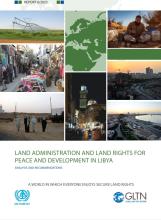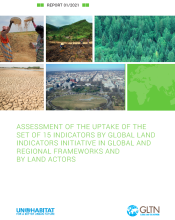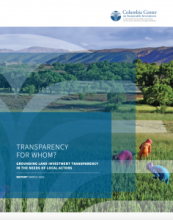Land Library
Welcome to the Land Portal Library. Explore our vast collection of open-access resources (over 74,000) including reports, journal articles, research papers, peer-reviewed publications, legal documents, videos and much more.
/ library resources
Showing items 1 through 9 of 174.This report is a contribution towards the improvement of land management and land administration in Libya.
To ensure a better and more sustainable future for all, the 2030 Agenda for Sustainable Development (“the 2030 Agenda”) has identified 17 Sustainable Development Goals (SDGs) to be achieved by 2030.
The Global Land Indicators Initiative (GLII) platform was established in 2012 through the joint effort of United Nations Human Settlements Programme (UN-Habitat), the World Bank and Millennium Challenge Corporation with the aim of making global-scale monitoring of land governance a reality by 202
New research by CCSI and the Centre pour l’Environnement et le Développement (CED) on transparency of land-based investment in Cameroon.
In the report, CCSI and CED find that:
Transparency is often seen as a means of improving governance and accountability of investment, but its potential to do so is hindered by vague definitions and failures to focus on the needs of key local actors.
This note proves recommendations for governments, international actors, and mining advocates who seek to optimize the value of green energy mineral reserves, to ensure that expectations for green energy materials do not replace careful planning, impact assessment, and allocation of risks, as well
This primer provides an introduction to some of the key issues that arise in the negotiation of contracts linked to investments in agriculture, and practical guidance for how to approach common issues.
This note provides guidance for civil society actors and communities on how to access and how to use the information contained in contracts with companies to be able to:
• Understand company and government obligations related to a company project;
The tool presented in this guide aims to assist policy-makers and land administrators to adopt appropriate technologies and methodologies for land administration services more efficiently, cost effectively and with options most appropriately tailored to national and sub-national contexts.







